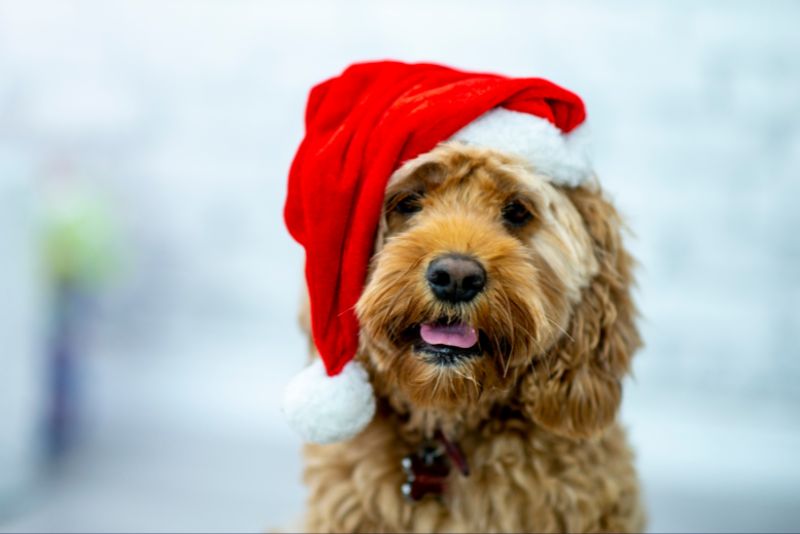Keep your pets safe this Christmas!

The pet-lovers among us couldn’t imagine spending Christmas without our furry friends, they are part of the family and likely to have a little gift under the tree awaiting the big day. However, the season does bring with it some additional perils – and some may surprise you!
Vet cases often spike around Christmas and New Year as worried pet owners battle with the unexpected dangers of the season. This includes everything from accidental ingestion of raisins, chocolate, and tinsel to fairy light and candle burns.
So what do you need to do to keep your pets safe this season?
Keep your pets away from the Christmas feast
According to Vets Now UK, 9 out of 10 poisonings happen while the pet is in their own home, and a shocking 5.5 million British pet owners unknowingly feed their pets harmful foods at Christmas:
Chocolate – contains a stimulant called theobromine that is poisonous to dogs, and severely poisonous to cats. Never put chocolate treats or gifts under the tree!
Christmas pudding – grapes, raisins, currants, and sultanas are toxic to cats and dogs, and that includes the mince pies left on the coffee table. Keep all puddings, pies, and panettone’s out of reach, and carefully dispose of leftovers.
Blue cheese – did you know that most blue cheeses contain a substance called roquefortine C, which dogs are sensitive to? Yes, you’ll simply have to eat it all yourself!
Alcohol – have you wondered why there are several brands of ‘doggie beer’ available? That’s because alcohol is so much more toxic to dogs than it is humans and can cause diarrhoea, breathing difficulties, tremors, coma or even death. For cats, just one tablespoon of alcohol could lead to death, so keep an eye on those jovial spillages and mop up quickly.
Cooked bones – beware of falling into the leftover trap! Once cooked, all bones become brittle and splinter easily, which could pierce your pet’s digestive tract or cause an obstruction. Like your puddings, pies, and chocolate wrappers, dispose of bones in the outside bin.
Dangerous décor and risky gifts
Unfortunately for us, it’s not just the food that our pets are attracted to eating. From tinsel to batteries, there’s a bounty of unique Christmas hazards you may not have even considered.
Vets warn that “dogs eat tinsel like we eat spaghetti”, and while cats love tinsel but tinsel doesn’t love cats”. Both cause serious blockages, or worse, work its way through the gut and into the intestine which can be extremely serious. The bottom line: keep your pet away from the Christmas tree and decorations and close the door when you can’t supervise them.
Did you know that ingesting a battery can cause a dog chemical burns and heavy metal poisoning? And consuming magnets can cause considerable damage if ingested. These are the types of risk that are far more prominent around this time of year as gifts are unwrapped and toys strewn across the floor.
On a similar note, it is also worth keeping an eye on those little packets of silica gel that fall out of packaging. Although they are non-toxic, they can cause blockages in the gut. The same applies for wrapping or crepe paper, and Lego, plastic, wood and any other toy or decorative item. These can be a choking hazard so please do be vigilant.
Candles may set a beautiful festive scene, and make a great gift, however they do burn paws and curious noses, and can fall over when brushed against. Keep cats away from them, and always ensure you blow them out before leaving a room.
Similarly, plants like ivy and poinsettia can be hazardous for your pets, even if they make for lovely festive decorations. Ingesting these leaves can cause vomiting, abdominal pain, increased salivation, and diarrhoea, and the sap can cause a painful contact rash. Cats are also highly intolerant of poinsettia, with similar symptoms if they ingest its leaves.
The last thing you want to be doing on Christmas Day is an impromptu trip to the emergency vet, however, if you suspect your pet has eaten something they shouldn’t, or injured themselves, please contact your vet or out or hours service immediately for advice.
And vitally, make sure you know which vet is open during the festive season so that you know who and how to access their services in an emergency. Contact your own vet directly or click ‘find emergency vet near me’ to review Vet Now’s national emergency network.
Protect your pet from theft
The risk of pet theft remains high, while prosecutions have fallen by a shocking 70% over the past 20 years. And with all the excitement that the festive season brings, there are some things you can do that can help prevent theft, or support you should the worst happen:
If you are visiting friends and family and unable to take your pets with you, make it appear that someone is home, from lending your neighbour’s visitors your driveway, to leaving lights on and closing your curtains.
It is now a legal requirement to ensure your pooch is microchipped and collared. Never more essential when you have friends and family coming in and out of the front door, and not all eyes on your furry friend. Should they escape, they are more likely to be returned.
Half of dog thefts are from gardens, and winter makes no difference. Ensure all gates and fences are secure before the season begins.
Avoid purchasing a stolen pet
We all know the adage “a dog is for life, not just for Christmas”. Many purchase a new family pet around this time of year, and sadly, many can find themselves at risk of being duped.
Unfortunately, the fastest and easiest way for pet thieves to make money is to sell the stolen pet, usually online. So what tell-tale signs should you be aware of?
Scammers are more likely to post on free sites, so be extra vigilant on sites such as Gumtree. If you are seeking a new furry family member, please do ensure you find out more about the breeder, and don’t be afraid to ask local animal shelters or the council if they have heard of them.
Obtaining all the relevant certification is essential, or if it is an older pet, ask about its past, request vet records, including the microchip, and call the vet to ask the important questions.
View the pet in his or her home so that you can see living conditions and, vitally, have an address to report should any problems arise. If a seller refused to engage in telephone calls and requests text only, refuses to allow you to view the pet in their own home and volunteers to bring the pet to you directly to view, that is a big red flag.
Celebrating Christmas in style
However you celebrate, we at Howden believe everyone deserves to enjoy the Christmas period! Pop into your local branch to see what fun, festive activities are on this December, from professional portrait sessions to mince pie and hot chocolate giveaways. Plus, find out how we’re trimming back the cost of Christmas!
This is a marketing blog by Howden.



